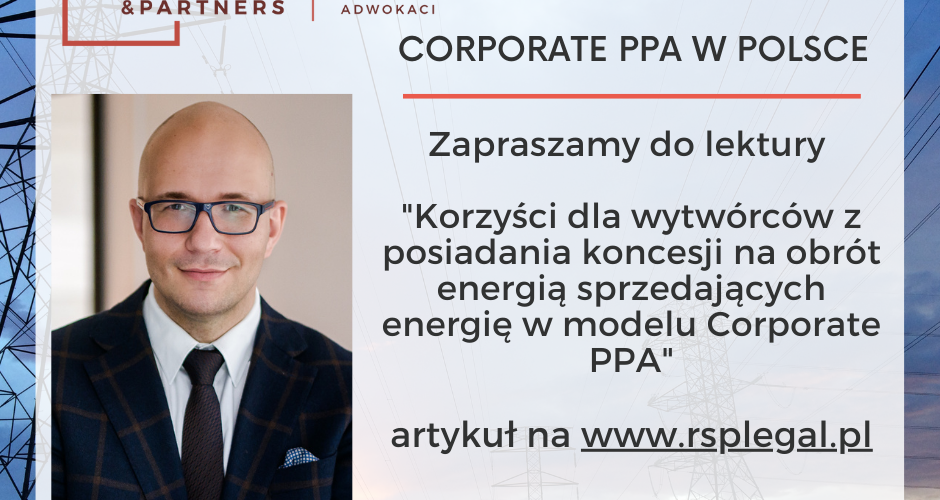1. Concession, or…
It is assumed that a concession is an act (in practice, an administrative decision), by which the administrative authority agrees to undertake and carry out a certain business activity, to the extent and under the conditions arising not only from the law, but also from the concession.
In practice, obligations are indicated in the administrative decision to grant a license. Readers who want to see examples of concessions (and the obligations indicated in them) can find any concession issued by the President of the Energy Regulatory Authority on the Registers and Lists website (ure.gov.pl).
Similar to concessions are permits and licenses found in road transport. The distinction between concessions and permits used to be justified by the fact that concessions are discretionary, i.e. that their granting depends on the will of the administrative body. The decision to grant a permit, on the other hand, was of a binding nature – a permit could not be denied if the prerequisites for its granting were met.
In my opinion, such a distinction, initiated in pre-war legal writing, has been outdated for many years. Indeed, the authority does not have complete freedom when licensing activities. The rationale that the authority must follow in granting or refusing to grant a license is set forth in the regulations. The decision to refuse to grant a license is subject to court review. In addition, there are known cases where the denial of concessions judged arbitrary resulted in a dispute before international investment arbitration.
An important feature of concessions is their non-transferability. The Law – Energy Law also contains provisions aimed at preventing the phenomenon of concession trading. This is because in the process of granting a concession, subjective characteristics are also taken into account, related, for example, to not having a criminal record.
2. Who needs a license
The types of energy activities that are subject to licensing are indicated in Article 32 of the Energy Law. I will introduce the readers to two of them, most closely related to the subject of the article.
Electricity generation license
According to Article 32(1)(1)(c) of the Energy Law, it is required to obtain a license to carry out business activities in the field of energy production, excluding, among other things, the production of electricity in a micro-installation or small installation.
According to Article 2(19) of the RES Law, a micro-installation is an installation of a renewable energy source with a total installed electrical capacity of no more than 50 kW, connected to an electric grid with a rated voltage of less than 110 kV, or with a cogenerated thermal power of no more than 150 kW, with a total installed electrical capacity of no more than 50 kW.
In Article 2(18) of the RES Law, a small installation is defined as a renewable energy source installation with a total installed electrical capacity of more than 50 kW and no more than 1 MW, connected to an electricity grid with a rated voltage of less than 110 kV, or with a cogenerated heat output of more than 150 kW and less than 3 MW, with a total installed electrical capacity of more than 50 kW and no more than 1 MW.
Accordingly, it is required to obtain a license to conduct a business activity involving the generation of energy in a RES installation greater than 1 MW.
Whether an installation is a micro-installation, subject to registration in the register of small installations or subject to licensing is determined by its installed electrical power. In the past, the qualification criteria were known from a communiqué from the President of the ERO. In one of the subsequent amendments to the RES Act, Article 2, point 19b of the Act was added, according to which the power
installed electrical power of a renewable energy source installation is the total rated active power:
a) a unit of equipment used to generate electricity – generator set, given by the manufacturer on the nameplate, or in the absence of such a nameplate, the active rated power of this unit as determined by a body accredited by the Polish Center for Accreditation – in the case of a renewable energy source installation using biogas or agricultural biogas to generate electricity,
b) the generator, photovoltaic module or fuel cell indicated by the manufacturer on the nameplate – in the case of an installation other than that indicated in letter a.
Therefore, as a rule, what is the installed electrical power, we find out from the nameplate.
It is worth mentioning that in order to obtain a license to generate energy from RES, it is necessary to meet the conditions of Article 32 paragraph 1a of the Energy Law. These conditions apply to the equipment included in this installation, used to generate this energy.
Possibility of reselling the generated energy
The question often arises as to whether, in order to sell the energy he generates, the generator must also have a license to trade in electricity.
Article 32.1 of the Energy Law, cited above, clearly indicates that it is required to obtain a license in order to carry out business activities. The Energy Law does not resolve what conducting business activity is. Instead, the definition of business activity is contained in Article 3 of the Law – Entrepreneur Law. According to this provision, a business activity is an organized profit-making activity, carried out on its own behalf and continuously. An activity is gainful if it is carried out for the purpose of earning income (profit).
If the generator could not resell the energy it generated, its activity would not be profit-making – so it would not constitute an economic activity and would not require any license.
A generator of energy from RES that sells the energy it generates does not need to have a separate license for energy trading. This is because such a generator is in the business of energy production, not trading. His business consists of marketing the generated energy, and this falls within the concept of a generator.
In practice, a generator can feed electricity into the distribution network and sell it to others, based on relevant contracts.
However, a generator of energy from RES cannot buy electricity for resale.
Electricity trading concession
According to Article 32(1)(4) of the Energy Law, electricity trading requires a license. The provision in Article 3(6) of the Energy Law stipulates that trading is a business activity involving wholesale or retail trade in fuels or energy.
Article 32(1)(4) of the Energy Law also indicates exemptions from the obligation to obtain a license for electricity trading. For example, the trading of gaseous fuels and electricity by an energy cooperative, as defined in Article 2(33a) of the Law on Renewable Energy Sources of February 20, 2015 (hereinafter: the RES Law), carried out as part of the activities conducted for the benefit of all customers belonging to the cooperative, does not require a license.
The seller of electricity (electricity trading company) may be the entity responsible for commercial balancing as a participant in the balancing market.
In this regard, there is some freedom. An energy seller can independently act as an entity responsible for commercial balancing. It may also enter into an agreement with another trading company that is a party to the agreement with Polskie Sieci Elektroenergetyczne SA (hereinafter: PSE) and agrees to take responsibility for its imbalances.
The document entitled Balancing Market Conditions, approved by the decision of the President of the ERO with the mark DRR.WRE.744.35.2019.PSt dated March 5, 2020, indicates that a balancing market participant, in order for PSE to execute its energy sales contracts, is required to:
- hold the relevant licenses, if there is such a legal requirement;
- to conclude a transmission agreement with PSE to the extent appropriate to the type of balancing market activity conducted
- conclude a distribution agreement with the relevant DSO.
3. Whether it is possible to sell energy to the end user bypassing the distribution network
The above question arises particularly often in the case of commercial or logistics facilities. Extensive, slightly sloping or flat roofs of such facilities can be an excellent place to deploy photovoltaic installations. However, in order to supply electricity to tenants, e.g. under a so-called Corporate PPA, it is necessary to introduce this energy into the distribution network.
According to Article 5 (1) of the Energy Law, the supply of energy is carried out, after prior connection to the network referred to in Article 7, on the basis of a sales contract and a contract for the provision of transmission or distribution services.
This provision, in my opinion, prejudges that the only legally permissible way of supplying energy is through the distribution network and after the prior conclusion of a distribution agreement.
The break from this rule is the institution of the so-called direct line.
According to Article 3(11f) of the Energy Law, a direct line is a power line that connects a separate power generation unit directly to a customer, or a power line that connects a power generation unit of a power company with installations belonging to that company or installations belonging to its subsidiaries.
As the law stands now, it is a virtually dead institution. The position of the ERO President is that any entity that uses the national electricity system must bear the costs of participating in the system. The sale of energy through the distribution network involves distribution fees. If industrial plants were to start sourcing from RES sources integrated with them through direct lines, then a larger share of the cost of maintaining the distribution system would have to be borne by household consumers and smaller business.
In practice, it is not possible to sell electricity bypassing the distribution network.
4. Whether it is possible to sell energy to the end customer bypassing the trading company
Contracts under which a customer buys electricity from a generator are called corporate PPAs, or Corporate Power Purchase Agreements (cPPAs).
There are different models of corporate PPA in the European market, which is reflected in the nomenclature used. The simplest division takes into account the existence of corporate PPAs with physical delivery of energy and financial corporate PPAs, also called virtual ones. A financial corporate PPA is essentially a contract for difference. Polish RES power producers do not need to be reminded of what a contract for difference is all about. It is enough to mention that the use of a contract for difference is also the essence of the auction support mechanism.
It should also be borne in mind that the subject of a corporate PPA does not have to be the entire volume of energy generated at a given installation. Any surplus can be sold to the trading company.
In practice, any corporate PPA with physical delivery involves the use of a trading company. The trading company either buys back the energy for resale to the end-user (a simpler solution), but at least balances the energy in relation to the generator’s production profile and the end-user’s consumption profile, and purchases surplus energy over the end-user’s consumption.
Renewable energy generators are offered a contract by trading companies:
- with a fixed price for a certain period of time;
- a market access agreement.
5. electricity trading license for RES power generator
A concession for electricity generation allows for the sale of generated energy and feeding it into the grid, but prevents it from meeting the needs of the end user.
RES sources, especially wind and photovoltaic, are not controllable. Instead, consumer needs are time-varying and independent of weather factors, which determine the amount of energy production.
For this reason, there is a need for an entity that will buy up the missing energy or resell unnecessary surpluses. The power generation license does not allow for such a role. The generator can sell the energy produced, but cannot buy energy on the market for resale.
Obtaining an electricity trading license gives the right to buy energy for resale. Thus, it is possible to supply consumers with energy.
Therefore, a potential benefit of obtaining an electricity trading license is the ability to eliminate the intermediation of an additional entity holding such a license.
Besides, having an electricity trading license increases business opportunities, such as allowing aggregation of distributed renewable energy installations and more active participation on the Polish Power Exchange.
Author Grzegorz Mikos is a legal counsel at Raczynski Skalski Radcowie Prawni Adwokaci spp. www.rsplegal.pl
The law firm advised, among others, Górażdże Cement SA on the conclusion of a 10-year CPPA (Corporate PPA ) covering the sale of electricity from the 64 MW photovoltaic farm located in Witnica. This is one of the largest Corporate PPAs concluded for electricity consumers located in Poland.
www.rsplegal.pl/doradzalismy-przy-najwiekszej-umowie-corporate-ppa-w-polsce/
Our law firm advised in one of the first Corporate PPAs in Poland, the energy trading company Axpo Polska sp. z o.o. in an agreement with Poland’s largest international furniture store chain regarding the purchase of electricity from RES (from the furniture store owner’s generating sources) and subsequent sale of this energy to the furniture store owner’s generating facilities and large-format stores. The scope of our services included the preparation of contracts for the purchase of energy from RES, contracts for the sale to the client’s stores and plants, and the implementation of these solutions in the operations department of Axpo Polska sp. z o.o.



